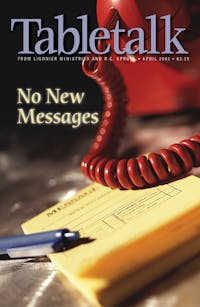
Request your free, three-month trial to Tabletalk magazine. You’ll receive the print issue monthly and gain immediate digital access to decades of archives. This trial is risk-free. No credit card required.
Try Tabletalk NowAlready receive Tabletalk magazine every month?
Verify your email address to gain unlimited access.
Are you Spirit-filled? Have you received the “second blessing”? Are you seeking it? For many, these questions have become the litmus test for the true Christian experience. Sadly, questions such as these leave many confused and disheartened as they await their “personal” Pentecost. Even worse, they lead to complacency about pneumatology, the study of the Holy Spirit.
Ironically, in a time when the Holy Spirit’s popularity is at an all-time high, “communion with Him in a developing knowledge of Him is much less frequently explored.” So writes Dr. Sinclair B. Ferguson in The Holy Spirit, a volume of the Contours of Christian Theology series. The book offers refreshment to those pursuing “intimate communion with Him by whom we are brought to worship, glorify and obey the Father and the Son.”
Ferguson, a former professor at Westminster Theological Seminary in Philadelphia and now minister of St. George’s-Tron Parish Church in Glasgow, Scotland, traces the person and work of the Spirit theologically, redemptive-historically, and devotionally, leaving the reader biblically reacquainted with the third person of the Trinity. We are introduced to the Spirit during His work at creation. We meet Him again later as the “executive of Exodus,” and again in Isaiah 63:10 as the One who was grieved. We receive comfort from the Paraclete, “[who] comes as the Spirit of Christ in such a way that to possess Him is to possess Christ Himself.”
This book also provides a sober assessment of contemporary issues, such as tongues and prophecy, in light of Scripture. Special attention is given to the modern continuationist/cessationist debate.
The book’s readability is characteristic of the Contours series. The language is a masterful blend of precision and eloquence. The usage of Hebrew, Greek, and Latin is insightful without being overly “technical.” Another feature is a six-page reading list for further study.
The Holy Spirit, published by InterVarsity Press, is recommended to laity and clergy alike.
